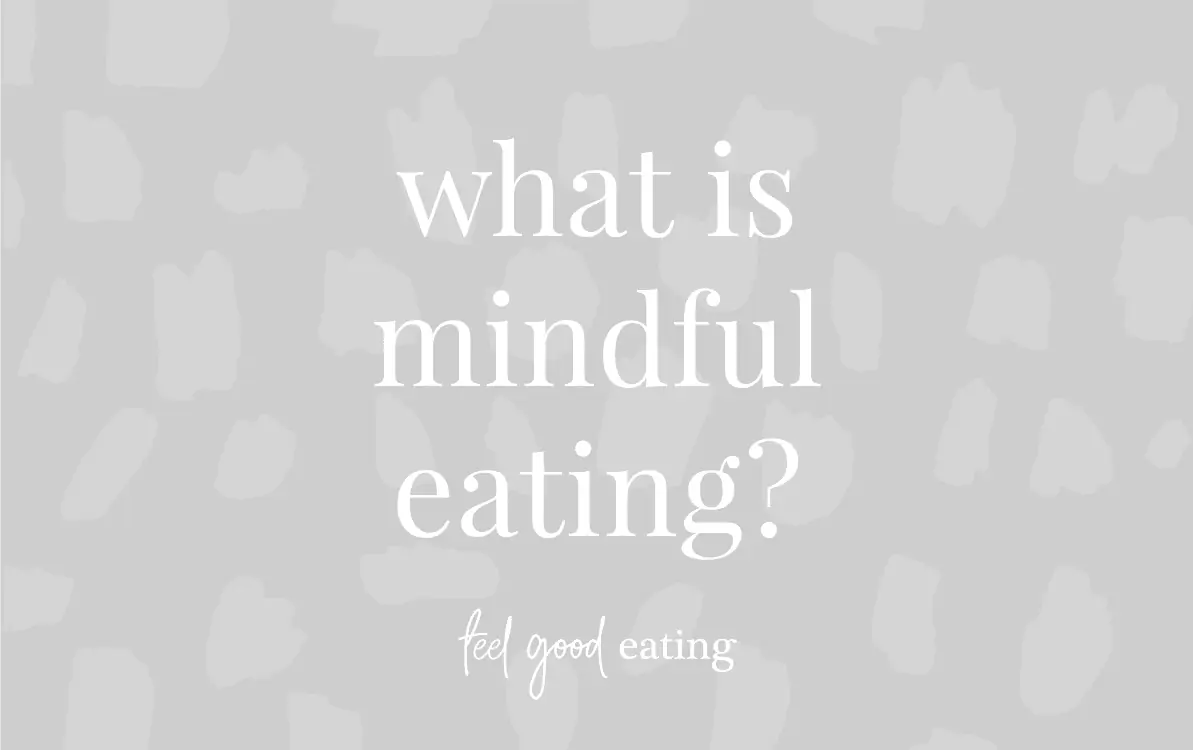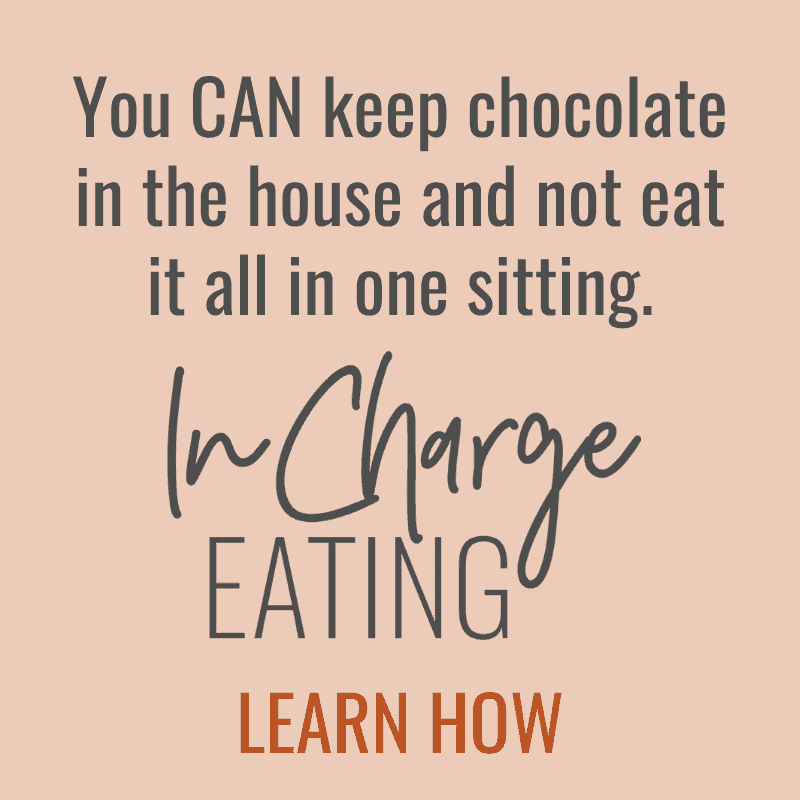Mindful eating has definitely become a health and wellness buzz word.
This, of course, means there is a LOT of information springing up online and, in the media, daily. I have a Google alert set up, so I see the volumes of stuff being published all the time. Some of the information captures the true spirit of mindful eating. And some…well…let’s just say that is the Internet for you isn’t it? (Trying my best to be diplomatic here!)
With the continuing flood of articles, resources, memes etc on mindful eating, I wouldn’t be surprised if you were asking, “What is mindful eating anyway?”
So, let’s unpack what mindful eating is really all about.
what is mindful eating?
Quick history lesson!
Mindful eating has evolved out of the more traditional mindfulness philosophies. Think Eastern meditation practices like Buddhism.
So, it is the application of mindfulness to our interactions with food and the act of eating.
One of the key players in the mindfulness space in Western psychology, Jon Kabat-Zinn, defines mindfulness as; “Paying attention in a particular way: on purpose, in the present moment, and non-judgmentally.”
If we apply that definition to the act of eating and break it down a bit more, mindful eating is about:
- bringing awareness to our internal physical signals of hunger and fullness to guide when we start and stop eating (i.e. tuning into hunger and honouring fullness)
- engaging all of our senses (sight, sound, smell, touch, taste) when choosing and eating food, so that eating is both satisfying and nourishing to our body
- acknowledging our experience with food and eating without judgement
- choice and flexibility
- acknowledging that all eating experiences are unique to the situation, moment and to us as individuals and that there is always something that can be learnt from the experience
- self-care
Put simply, mindful eating is about focusing our attention, on purpose, on the act of eating, without any judgement. It involves eating with awareness of all of our senses- our sight, sound, touch, taste and smell.
So, it goes a bit deeper than just eating slowly and chewing our food properly without the TV on…!
what mindful eating isn’t
A weight loss strategy.
The Centre for Mindful Eating has this to say about mindful eating:
“It is not outcome-based and does not promote any specific body shape or size. Based on scientific research, TCME expresses caution and concern about engaging in mindful eating exercises for weight loss. A weight focus and related stigmatization may exacerbate psychological issues such as guilt and shame and may keep individuals caught in an unbalanced eating cycle.”
But, unfortunately, the diet industry has latched on to the hunger/fullness part of mindful eating and are proclaiming that if we are eating mindfully we will, in theory, eat less and that eating less will result in weight loss.
This is waaaayyyyy too simplistic given we know that there is so much more involved than just calories in versus calories out. Treating mindful eating like any other weight loss strategy means when it doesn’t work in the way we were expecting (i.e. when the weight doesn’t just melt away), mindful eating is seen as yet another thing we have failed at. And what happens when we fail at a diet? We give it up and move onto the next thing. Which is a real shame, as we are potentially missing out on all of the benefits that mindful eating can bring to our life.
Bottom line is: if someone is pitching mindful eating to you as a way to lose weight, or as a way to ‘curb your cravings’, they don’t fully get it and you should be hightailing it out of there!
Since we are on the subject, mindful eating is also not:
- a diet (although if you are doing it to lose weight, it essentially becomes one!!)
- prescriptive
- a trick or tool to control your body’s size or appearance
why eat mindfully?
Thanks to our diet and weight-obsessed culture, eating and food have become complicated. We are constantly bombarded with new, and let’s face it, confusing, rules about food. The one seemingly consistent message, however, is that food is something that should be controlled and that eating in excess is a bad thing.
But what happens if one of those ‘rules’ are broken? For example, eating in excess? The typically thought process goes something along the lines of:
“Ughhhhh I ate wayyyyyyy too much. I am a such a pig. My eating is out of control. I have no willpower. I must be addicted to food.”
We start to believe that our eating and food choices are a reflection on our character and worth as a person.
So, the most valuable thing mindful eating can do is help to tune out all of that external noise and chaos and bring us home to our body.
It helps us turn down the volume all of that chatter and anxiety in your mind about whether we are doing the ‘right thing’ or being a good person when it comes to eating.
Mindful eating helps us to trust that our body has the wisdom within it to guide food choices and to eat in tune with our appetite – there are no meal plans, calorie counting, or app tracking required!
And when we become more in touch with the internal signals our bodies send us about when to start and stop eating, a bit like Goldilocks, we eat the type and amount of food that feels ‘just right’ and are not left feeling hungry after a meal or feeling the discomfort of overeating.
Here are some other reasons why mindful eating is so great:
- When we eat without judgement, our variety of food often expands so that by default, we eat a more nutritionally balanced diet;
- When we are attuned to what we are eating and how that food makes our body feel, it becomes easier to choose foods that energise us and make us feel good;
- The act of eating can turn from something that is stressful, hectic, or a chore into something that is calming and pleasurable. After all, nourishing our body with food is biologically designed to be pleasurable!
- Mindful eating is empowering – we become the masters of our own body and don’t need external influences to tell us how/what/when to eat
- Mindful eating can offer physical, mental and emotional freedom from “dieting” thoughts and behaviours
meh, this seems like hard work. where would I even start?
Spoiler alert: you can’t get mindful eating right or wrong – so long as you are giving it a go.
With mindful eating, we are trying to move away from rules. So, if you come across a mindful eating ‘tip’ that sounds a bit prescriptive, like ‘make sure you put your knife and fork down between each bite’, or ‘chew each mouthful 40 times’, or ‘stop eating when you are 80% full’, then you want to give them a wide berth.
Instead, start where you are and start small.
It could be something as simple as asking yourself the question “Am I hungry?” and “What do I feel like eating?”. These questions allow you to be instantly more mindful because in order to answer them, you have to take a pause and check in with what your body is feeling and telling you.
I also love this video by dietitian Fiona Sutherland from Body Positive Australia on how you can start mindful eating with 1 Mindful Bite.
Or if you are wanting some help starting your own mindful eating practice, I would love to invite you to join me for A Taste Of Mindful Eating. It is my online program which, as the name suggests, gives you a taste of mindful eating. In it you will learn the practical skills of mindful eating and transform the connection with your body’s inner wisdom, so you never have to diet again!
Whatever you decide to experiment with, keep in the back of your mind that mindful eating is about eating without judgement. Remember to be kind to yourself, get curious and don’t take things too seriously. Have fun exploring!
have you tried mindful eating? do you have any tips for someone starting out?




 Hi! My name is Nina.
I’m a Certified Intuitive Eating Counsellor taking the ‘diet’ out of Dietitian. I am here to help you reject diet culture, tune into your body’s own inner wisdom about how to truly nourish yourself and ultimately feel good eating™
Hi! My name is Nina.
I’m a Certified Intuitive Eating Counsellor taking the ‘diet’ out of Dietitian. I am here to help you reject diet culture, tune into your body’s own inner wisdom about how to truly nourish yourself and ultimately feel good eating™ 

Mindful eating and mindfulness in general can be very overwhelming. I think it takes years to really figure out. Thanks for making it more approachable to all of us
You are most welcome – thanks for taking the time to read.
I’m so glad I found your blog, I have mostly overcome the dieting curse, but it’s good to read others, like you, who have the same mindset. This lets me know I am still on the best path and keeps me encouraged. Thanks for the work you do.
Thank you Mary – you sound like you have done some hard work to get to where you are.